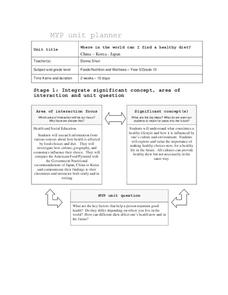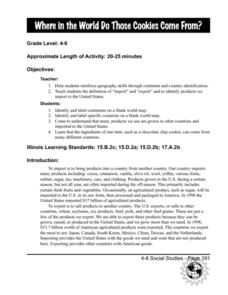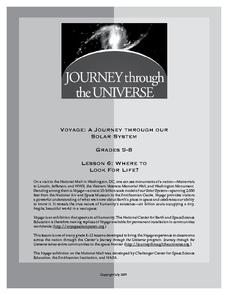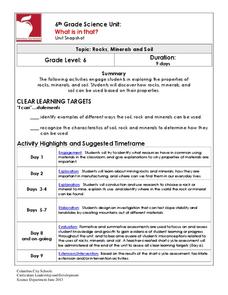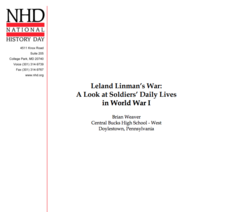Curated OER
Four Corners Mystery: Where In The World Are We?
Students research and describe various locations around the world using five fundamental themes of geography.
Curated OER
Maps and Globes: Where in the World are We?
Students explore maps and globes. In this introduction to map and globe concepts lesson, students identify features of physical maps, political maps, and globes. Students locate land and water, and recite a poem about the names of the...
EngageNY
Writing and Graphing Inequalities in Real-World Problems
Inequalities: when one solution just doesn't suffice. Individuals learn to write inequalities in real-world contexts and graph solution sets on the number line. All inequalities in the instructional activity are of the form x < c or x...
Ohio State University
Where in the World Can I Find a Healthy Diet?
What constitutes a healthy diet? In what way is a healthy diet defined and influenced by culture? Groups investigate the community and national resources available in a country, and then design a healthy diet for its citizens.
Scholastic
A Reading Guide to A Wrinkle in Time
Accompany a reading of Madeleine L'Engle's classic tale, A Wrinkle in Time, with a detailed guide equipped with 15 informative and useful chapters. Scholars discover who the author is, why she wrote the book, and crucial story elements...
K12 Reader
Absolute Location
Where in the world are we? As a reading comprehension exercise, kids read a short passage about navigation using latitude and longitude, and then respond to a series of questions based on the article.
Curated OER
Where in the World Do Those Cookies Come From?
Learners discuss exports and imports by discovering where the ingredients come from for making chocolate chip cookies. They take a survey of their favorite cookies and create a bar graph to represent the information.
Journey Through the Universe
Where to Look For Life?
Every year we discover new planets including more than 1,000 in 2016 alone. Will we ever find life on another planet? The lesson includes two activities to help scholars understand this concept. First, they analyze the temperature range...
Curated OER
Where Is Japan? How Are We Alike And Different?
First graders use literature, maps, and globes to explain how physical environments in various parts of the world are similar to and different from one's own, and that certain areas have common characteristics and can be called regions.
Columbus City Schools
What is in that?
Invite your class to dig in to an engaging journey into the world of mining! Here you'll find the tools to equip young miners with knowledge of soil, rocks, and minerals, as well as types of mining operations. To round things out, the...
Curated OER
Where In the World Are We?
Fifth graders read postcards and find their locations on maps. They use the pictures and text on the postcards to write about imaginary vacations. They compute the mileage and compare it to TripMaker data.
National History Day
Leland Linman’s War: A Look at Soldiers’ Daily Lives in World War I
Hunkering down in the trenches of World War I, Leland Linman decided to write a journal about his experiences. By reading Linman's entries in the fourth installment of an eight-part lesson series, scholars get a firsthand look at life in...
University of Wisconsin
Don Quixote in Wisconsin
Are you looking for background information on Cervantes and his Don Quixote? How about a study guide and discussion questions or project ideas? Even journal prompts, tests, and quizzes? A 98-page teaching guide simplifies the quest with...
Indiana University
World Literature: "One Evening in the Rainy Season" Shi Zhecun
Did you know that modern Chinese literature “grew from the psychoanalytical theory of Sigmund Freud”? Designed for a world literature class, seniors are introduced to “One Evening in the Rainy Season,” Shi Zhecun’s stream of...
Curated OER
What We Eat, Where We Sleep: Documenting Daily Life to Tell Stories
This is not just a New York Time article to read, this is a set of amazing activity ideas all related to the slide shows "Breaking Bread Everywhere" and "Where Children Sleep." Your class can view each show, read about what they mean...
Curated OER
Compare and Contrast Timelines of the World
Seventh graders create a classroom timeline of important world events. This lesson is meant to be used during the entire school year. As the school year goes along, events are added to the timeline as chosen by the class. The events are...
California Academy of Science
Exploring the Impacts of Feeding the World
Approximately 50 percent of people in the world who are chronically hungry work in agriculture. While it seems counter-intuitive, the farther you live from a farm, the more food options are available. Scholars explore concepts related to...
Curated OER
"Where the Wild Things Are" Lesson Plans
"Where the Wild Things Are" lesson plans can help students appreciate the beauty of words and illustrations.
Population Connection
The Carbon Crunch
Carbon is in the air; should we care? Teach the class why it is important to pay attention to carbon levels and how the world population and various countries across the globe affect the carbon levels in the atmosphere. High schoolers...
Curated OER
Where In the World is the Dominican Republic?
Students begin the activity by discussing how where they live affects how they live. As a class, they add examples to each category such as home types, clothing, jobs and food. Using those categories, they write about their life in the...
Teach With Movies
Learning Guide to: Schindler's List
Take your history class through Schindler's List with a learning guide, which offers an introduction to the film and a variety of discussion questions and related assignments. There are several useful resources in the sidebar, such as a...
NOAA
A Watery World
With about 70% of the earth's surface covered in oceans, it's fair to say that we live in a very wet world. Young scientists gain a better appreciation of this fact as they use maps to identify the world's ocean basins in the first...
Illustrative Mathematics
How Many Cells Are in the Human Body?
Investigating the large numbers of science is the task in a simple but deep activity. Given a one-sentence problem set-up and some basic assumptions, the class sets off on an open-ended investigation that really gives some context to all...
Population Connection
Where Do We Grow from Here?
Did you know that the population is expected to grow to 11 billion by 2100? The resource serves final installment in a six-part series on the global population and its effects. Scholars interpret data from the United Nations about the...





